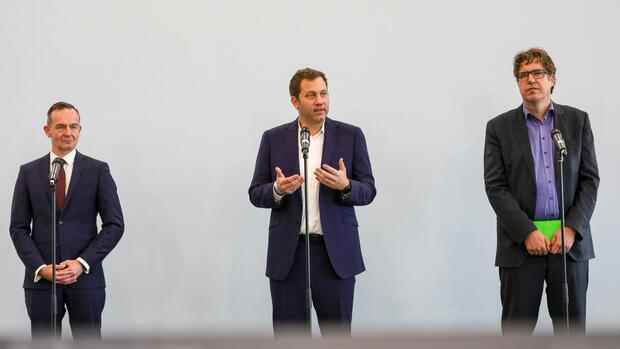Berlin Volker Wissing, Lars Klingbeil and Michael Kellner look exhausted, but satisfied. When the three of them were asked at the press conference on Tuesday whether a traffic light alliance had become more likely, Kellner looked at Klingbeil until he finally spread his hands in a sweeping gesture and said: “I think we’re on the right track.”
The fate of the country depends on the three general secretaries – with the Greens the job is only federal manager. Klingbeil, Kellner and Wissing are not only important members of the negotiating teams of their parties, but are also responsible these days for jointly drawing up an exploratory paper that is to be presented this Friday.
This is by no means just a protocol, but also a highly political one. On the basis of this paper, the three traffic light parties want to decide at the weekend whether they will enter into coalition negotiations next week. The three General Secretaries play a key role in the process. All three could benefit in the end and use the explorations to position themselves for higher offices.
Klingbeil: Solid as a rock
Lars Klingbeil is next to Scholz the big winner of the election campaign. The fact that the SPD made what was not believed possible and won the election is also attributed to his campaign. Klingbeil is also internally praised for keeping the SPD leaders together in turbulent times.
Top jobs of the day
Find the best jobs now and
be notified by email.
In his almost four years as general secretary, he served no fewer than eight SPD chairmen. But Klingbeil can also score points with the voters. The general secretary sometimes sits down on a talk show and plays his guitar. With 47.6 percent, Klingbeil got the second best first vote result of all SPD candidates in his constituency.
It didn’t always go so smoothly. The excruciatingly long search for an SPD chairman in 2019 with 19 regional conferences was blamed on Klingbeil, he was also said to have given too little impetus, he was too nice for the job of general secretary, which also involves tough attacks on political opponents .
With the election victory, Klingbeil can now claim higher offices. It is no secret that he would like to become Minister of Defense. 7,000 Bundeswehr soldiers are stationed in his hometown of Munster. Klingbeil would also be an option as party leader should there be a change at the top of the party in December.
Waiter: The man under pressure
The most experienced of the general secretaries is Michael Kellner. For eight years he has stood by the side of the party leaders as the Greens federal manager and in this role already negotiated a Jamaica alliance with the Union and FDP in 2017. He is said to have a good relationship with Lars Klingbeil – the two have known and valued each other since Years.
If there is actually a traffic light government, the 44-year-old can calculate his chances of higher tasks. If the current co-bosses Annalena Baerbock and Robert Habeck move into the cabinet of a traffic light alliance, the Greens need a successor duo in eight months at the latest, because ministerial and party offices must be separated in the party. Waiters are said to have ambitions for this position.
Whether he has a good chance or not depends on the outcome of the negotiations. Because Kellner is actually the loser in the election among the general secretaries. The Greens lagged significantly behind polls at the beginning of the election campaign, when the party was the strongest force with prospects for the Chancellery.
Waiter also has his part in it, say some in the party. The reaction of the Greens to the criticism of Baerbock’s curriculum vitae and book seemed in places unsupervised. At the time, Kellner spoke of “character assassination”. However, the offensive did not lead to the criticism of Baerbock subsiding – on the contrary.
Wissing: “Mister Ampel”
In the FDP, Volker Wissing is known as “Mister Ampel”. In Rhineland-Palatinate, he helped build a successful coalition of the SPD, the Greens and the FDP. What worked at the state level should now also work at the federal level – the 51-year-old could receive a reward for this. Because the trained lawyer would definitely have prospects of the post of Federal Minister of Justice in a traffic light government.
In Mainz he was Deputy Prime Minister of the Ministry of Economics, Transport, Agriculture and Viticulture. Wissing’s appearance in Rhineland-Palatinate liked party leader Christian Lindner so much that he brought the man from Palatinate to Berlin in September 2020 for the hapless General Secretary Linda Teuteberg. A change in personnel that did not go down well everywhere, as female executives in the FDP tend to be in short supply anyway.
Wissing began the task with a clear mission: to make the FDP capable of governing and to get it out of the low polls at the time. He seems to have succeeded in both. The fact that Wissing is seen in the FDP as the man who could make a traffic light coalition possible at the federal level is not only due to his national political past. You rarely hear loud or even aggressive tones from him – the right man for difficult negotiations with completely different partners.
The selfie after the first dinner between the FDP and the Greens, on which both Lindner and Wissing could be seen, speaks volumes: Wissing is the new strong man at the side of the party leader.
More: This is really how it is with the federal budget – and that is how much money the next coalition can distribute
